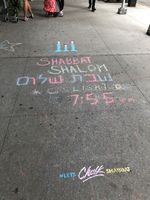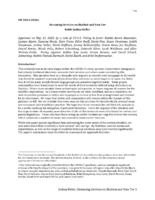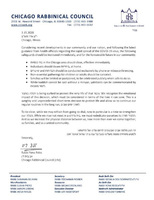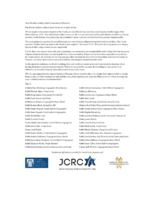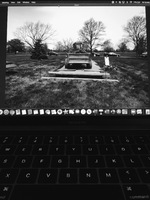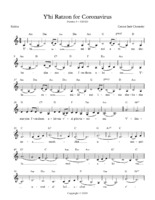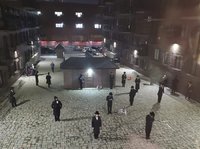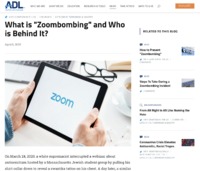CTT Collected Items Browse
Item set
- Title
-
CTT Collected Items Browse
Items
-
Let's Chalk Shabbat
Announcement of Shabbat candle lighting time chalked on sidewalk outside Trader Joe's on Manhattan's Upper West Side -
Conservative Responsum: Streaming Services on Shabbat and Yom Tov
Responsum approved by the Conservative / Masorti Rabbinical Assembly -
Chicago Rabbinical Council statements March-May 2020
Letters from the Chicago Rabbinical Council on community guidelines during the COVID-19 pandemic -
A Perspective of an Agnostic/Atheist from a Jewish Family
I am not affiliated with any religion and have trouble believing in a higher being as described in many houses of worship. The coronavirus pandemic, by sending religions scrambling to redefine important traditions, has strengthened these secular beliefs. However, I appreciate the uplifting effects that religion can have on families during this trying time. Because of social distancing measures, this year was the first time my family held Passover completely alone. This was a gloomy thought as Passover is a holiday to spend time with and appreciate family and friends. Surprisingly, though, quarantine managed to gather our geographically scattered family in a way we never could. I am attending college in another state and normally cannot come home for Passover. This year the pandemic fortuitously returned me home right before it began. Then, with the help of newly popularized video platforms like Zoom, we were able to celebrate the Passover seder with nearly all of my mom’s family for the first time in my life. It still strikes me that the mixture of my family’s religion and the hardship of the pandemic created a family reunion that would probably not have happened otherwise. I disagree with many tenets of religion, but I will be forever grateful for its ability to bring people together. -
News and Events written to the Jewish Community of Missouri
Updates the congregation and provides words of encouragement -
Healing Heartbreak
Jewish religion heavily honors life cycle events as a way to guide practitioners through a moral, spiritual, and meaningful journey. When I was first informed of my 50-year-old uncle’s sudden death from a heart attack, I was in disbelief. How could such an incredible athlete with an admirable diet and a healthy lifestyle die from such a complication? Mike was the most intelligent and humble man I have ever known, pouring all of his heart into his children, his wife, his clients and anyone who had the privilege of meeting him. Most importantly, Mike embodied the Jewish community. After Mike’s passing, my aunt received deeply heartfelt emails from more people than imaginable. Mike continues to unite the sense of a Jewish community through his memory. When a Jewish person passes, it is custom that the funeral service and burial quickly follow to best preserve and honor the body. When the mourners return home from the funeral, the shiva - a formal, seven-day Jewish mourning - begins. The shiva serves to bring together the Jewish community in mourning and in celebration of the life of the deceased. The Jewish people were never instructed on how to properly mourn during a worldwide pandemic. Nonetheless, Mike’s wisdom surpassed precedent. Our extended family and friends gathered online to say the mourner’s kaddish, which does not mention death but rather asks God to pray for the souls of the deceased. Mimicking the environment of a shiva house, many people then shared stories of Mike, allowing for both cries and soft laughter to be heard. Mike’s memory joined family and friends from all across the nation, creating a sense of community and comfort that we all so deeply miss during this time of isolation. I know Mike will continue to embrace and uplift the Jewish community through his memory for years to come. -
Y'hi Ratzon -- Safe Together Apart
I am Cantor at a Conservative synagogue (Jewish) in Columbus, Ohio. I wrote this song/prayer shortly after the arrival of what was first called Coronavirus, then Covid-19 -- before the word pandemic was being commonly used. The song/prayer had coalesced by March 20. It is based on a somewhat obscure passage in the weekday Torah service (the Torah is read every Monday and Thursday) -- a passage theoretically recited between raising the Torah and returning it to the Ark. The original prayer asks God (our Father) to protect us from desolation and pestilence. I broadened it -- both in Hebrew and in English -- to think of God as both Father and Mother -- and to ask for protection for all of us (not just "b'nei Yisrael" -- the children of Israel) -- brothers and sisters in this country and around the world -- and to keep us Safe Together Apart -- which is the unique challenge to us in these times. I typically do either the Hebrew or the English (generally not both) between various services -- or in the midst of some services -- probably about 5x per week. As we still follow our basic traditional rituals, it hasn't altered the prayers that we do. . . it just gets added here and there. And I share it with other cantors, other Jewish spiritual leaders, and leaders of other faiths, at all appropriate opportunities. -
Minyan in Brooklyn, Photograph by Jacob Kornbluh
Orthodox Jewish minyan, March 17, 2020 -
Anti-Defamation League on antisemitic Zoombombing
The ADL created a list of instances of antisemitic "Zoombombing," where perpetrators intruded on synagogue services, Torah classes, or other meetings held on the Zoom video conferencing service.
